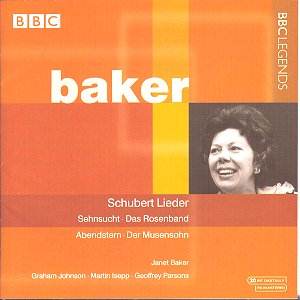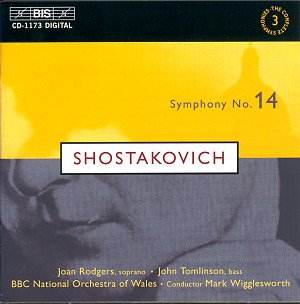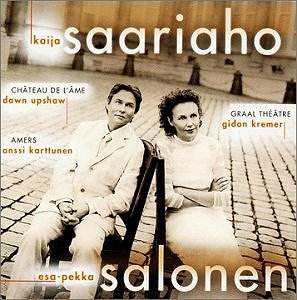 Franz SCHUBERT (1797-1828) Lieder: Die junge Nonne, D828; Das Rosenband, D280; Auf dem See, D543; Blumenlied, D431; Gondelfahrer, D808; Die Götter Griechenlands, D677; Der Jüngling und der Tod, D545; Schwestergrüße, D762; Amalia, D195; Der Jüngling am Bache, D30; Entzückung an Laura, D390; Sehnsucht, D636; Der Sieg, D805; Abendstern, D806; Atys, D585; Augenlied, D297; Memnon, D541; Auflösung, D807; Der Musensohn, D764
Franz SCHUBERT (1797-1828) Lieder: Die junge Nonne, D828; Das Rosenband, D280; Auf dem See, D543; Blumenlied, D431; Gondelfahrer, D808; Die Götter Griechenlands, D677; Der Jüngling und der Tod, D545; Schwestergrüße, D762; Amalia, D195; Der Jüngling am Bache, D30; Entzückung an Laura, D390; Sehnsucht, D636; Der Sieg, D805; Abendstern, D806; Atys, D585; Augenlied, D297; Memnon, D541; Auflösung, D807; Der Musensohn, D764
Performers: Janet Baker (mezzo-soprano); Graham Johnson (piano, Nos. 1-6); Martin Isepp (piano, Nos. 7-8); Geoffrey Parsons (piano, Nos. 9-19)
Recording: BBC LEGENDS BBCL 4070-2 [73.06]
Rec. Dates: Nos. 1-6: 2nd October 1977, The Maltings, Snape; Nos. 7-8: 20th April 1970, St John’s Smith Square, London; Nos. 9-19: 1st September 1980, Usher Hall, Edinburgh
In the pantheon of lieder interpretation, few figures shine as brightly as Janet Baker, whose artistry in Schubert’s songs is both celebrated and revered. This anthology, a collection of live performances spanning the decade from 1970 to 1980, offers a remarkable glimpse into Baker’s interpretive prowess, showcasing her affinity for the emotional depth and textual nuance that Schubert’s music demands.
The program is thoughtfully curated, weaving together both familiar and obscure lieder, drawing primarily from the works of Goethe, Schiller, and Mayrhofer. Baker’s engagement with these poets is palpable; she elicits distinct emotional landscapes from each text, a skill that is particularly evident in “Entzückung an Laura,” where her delicate pianissimo evokes a tender reverie, contrasting sharply with the more dramatic dynamics of “Sehnsucht.” Here, the interplay between voice and piano is masterful—Graham Johnson’s accompaniment in the former is fluid yet restrained, allowing Baker’s voice to shimmer like a whisper of longing, while the latter’s tempestuous character is underscored by vigorous, tempestuous piano lines.
Baker’s interpretive choices often reflect a deep understanding of Schubert’s harmonic language. In “Die Götter Griechenlands,” the seamless transition from the serene opening to a more turbulent middle section is handled with extraordinary grace. The subtle shifts in dynamics and articulation emphasize the text’s philosophical contemplations, effectively drawing the listener into a dialogue with the music. This nuanced approach to phrasing is a hallmark of Baker’s artistry, echoing the interpretive depth found in her earlier recordings with notable collaborators such as Gerald Moore.
The three pianists featured—Johnson, Martin Isepp, and Geoffrey Parsons—each bring their unique sensibilities to the performances. Johnson’s contributions, particularly in the opening group of songs, are characterized by a vibrant yet sensitive touch, employing a delicate balance between supporting the singer and asserting his own voice. Isepp’s accompaniment in “Der Jüngling und der Tod” is hauntingly atmospheric, enhancing the song’s poignant exploration of mortality. Parsons, in the latter portion of the collection, displays a robust lyricism, particularly evident in “Der Musensohn,” where the interplay between voice and piano reaches a rhapsodic climax.
Recording quality, while not uniform, is commendable in its clarity, capturing the warmth and immediacy of live performance. The acoustic discrepancies across the three venues do not detract from the overall listening experience; rather, they offer a glimpse into the environments in which these performances were realized. However, it is regrettable that the accompanying materials lack comprehensive texts and translations, a significant oversight given the importance of textual comprehension in lieder interpretation.
Historically, these songs occupy a crucial place in the lieder repertoire, often reflecting the Romantic era’s preoccupation with nature, emotion, and the human condition. The selection of less frequently performed works alongside the canonized favorites serves to illuminate Schubert’s vast creative landscape, showcasing his ability to conjure profound emotional resonance from both lyrical and harmonic innovation.
In conclusion, this anthology of Schubert lieder performed by Janet Baker stands as a testament to her extraordinary interpretative skill and emotional depth. The performances, enlivened by the pianistic talents of Johnson, Isepp, and Parsons, reveal not only the richness of Schubert’s output but also the enduring significance of lieder as a genre. While the production could have benefitted from a more thorough editorial approach, the musical content itself remains a compelling tribute to one of the great lieder singers of our time. This collection is not merely a preservation of performances but an invitation to experience the profound artistry that is Janet Baker, a true luminary in the world of art song.


